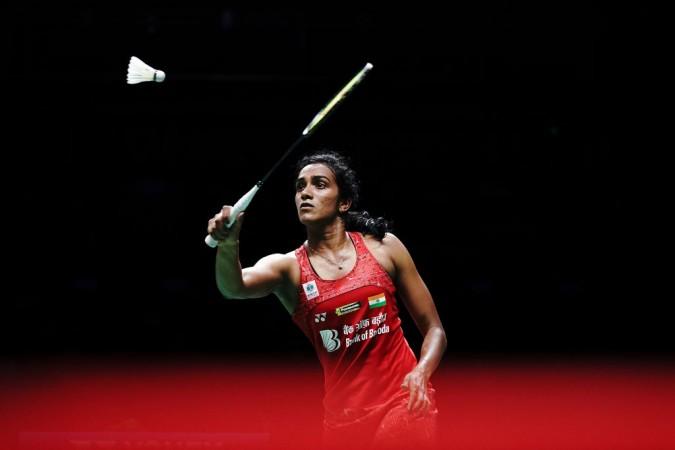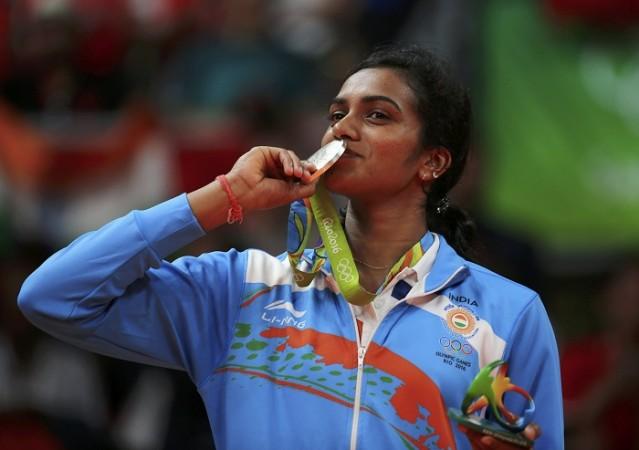PV Sindhu was looking set to end her major title drought on Sunday, August 5 in Nanjing. Having won against two of the best defensive players, including her arch-rival Nozomi Okuhara, in the quarter-final and semi-final rounds, the Indian ace shuttler was primed to break the finals jinx.
Sindhu has been one of the world's most consistent shuttlers in the recent past. Since 2013, the 23-year-old reached at least the semi-final of world championships on four occasions and an Olympic final. She has been a regular at the final stages of top-tier tournaments on the BWF tour.
However, a gold medal at major tournaments had been eluding her for quite some time.
Sunday's world championships final presented her with an opportunity to buck the trend but Sindhu once again finished second-best, making it three out of three in major tournaments.
She was bettered by Carolina Marin, the Spaniard who had piped her to win the Olympic gold at Rio Games finals two years ago.
It was her second straight defeat at world championships final as she had lost last year's gold medal match in Glasgow to Okuhara in a 110-minute marathon, which saw both shuttlers pushing themselves to the limits.
Criticism with C-word yet again

In contrast, Sindhu was comfortably beaten by Marin in Nanjing. Not surprisingly, the young shuttler has been facing harsh criticism and the C-word is once again being used to describe her failures to win gold medals at major tournaments.
Seeing a player, who oozes confidence both on and off the court, consistently struggle to clear the final hurdle comes as a surprise.
Sindhu was left heartbroken after the Rio Olympics and the Glasgow world meet defeats but she had not spoken about "frustration". For the first time, the Hyderabad-based shuttler looked deflated as she addressed the media after the straight-game defeat to Marin.
"It is very frustrating to lose again. Last time also I had played in the finals. It is quite sad and I have to come back stronger and get back to the sessions and prepare for the next tournament," Sindhu said.
One may argue that it has become more of a mental barrier than anything else for Sindhu at major tournament finals but Vimal Kumar, the former national champion and head coach of the Prakash Padukone Badminton Academy, says that the young shuttler's problems are anything but her mental strength.
"She will get it [the gold]. She can get little more tactically better. Everything else she has. It's not that difficult and eventually, I feel she will get it," Vimal told International Business Times, India.
Nanjing defeat was anything but a choke

Sindhu had started the final against Marin on a high. She was dealing with the reigning Olympic champion's aggressive approach with ease.
In fact, in the first game, Sindhu was drawing Marin into committing easy mistakes. However, a sudden dip in concentration coupled with her opponent's mind games meant the Olympic silver medalist conceded a few easy points and allowed the feisty Spaniard to come back into the game.
Sindhu went from leading Marin 16-11 to trailing her 16-17 and eventually lost the first game 21-19. The third seed started the second game poorly, conceding a 5-0 lead and was never able to come back into the match.
Marin looked a notch above the rest in Nanjing and she proved that in the final as well. For Sindhu, playing an extremely attack-minded player after overcoming two of the best defensive players in Okuhara and Yamaguchi proved to be a difficult task.
"That is how Marin plays. She will up the pace, she will put pressure on you. Hurrying her serve and irritating Sindhu. Tactically she employed everything she could and it was well done. But I wouldn't blame it on that," Vimal said.
He added: "Sindhu could have exactly played the same way if she had not committed errors and given away those three crucial points in the first game. Marin wasn't doing anything special up until that point, and Sindhu could have carried on. A few errors in the first game cost her the title."
Sindhu was 'gold standard' in Glasgow final

A reputed newspaper was slammed for calling Sindhu a "choker" after the defeat to Okuhara in Glasgow last August. The poorly-articulated piece and its author were met with severe criticism, and rightly so.
Neither of the two shuttlers wanted to give up in the fiercely-fought final. They kept defying the boundaries of mental and physical strength in a bid to win the yellow metal. However, in the eyes of many, both of them were worthy winners for they had brought joy to badminton fans.
Scorelines, sometimes, don't give us the full picture. The Glasgow final, which ended in favour of Okuhara (21-19, 20-22, 22-20), is a testament to that belief.

Marin lived up to the favourite tag in the Rio Olympic final
Public rituals, which were only exclusive to Indian cricketers, were conducted for the first time for a badminton player in the lead up to the Rio Olympic final involving Sindhu and Marin.
Indian public expected a lot from the young shuttler after what had been a disappointing few days for athletes from the country at the quadrennial tournament.
Sindhu wasn't the favourite back then. She was the underdog. The young shuttler clearly defied expectations and took the Olympic stage by surprise. She eased past the likes of Tai, Wang Yihan and Okuhara in straight games en route to the big final. With new-found confidence, Sindhu fought hard and pushed the match into a decider.
However, Marin, who had won two world championships gold medals before the Rio Olympics, lived up to the favourite tag and closed out the match.

Sindhu, the world number three, is right up there with the best in the business. In an ultra-competitive women's singles field (which is way more tougher and unpredictable than the current men's singles field), the Indian shuttler has managed to come up with consistent performances and maintain remarkable fitness levels.
She has reached four women's singles tournament finals this year, a feat only bettered by world number one Tai Tzu Ying. The elusive gold medal, as Vimal says, may not be far away.








